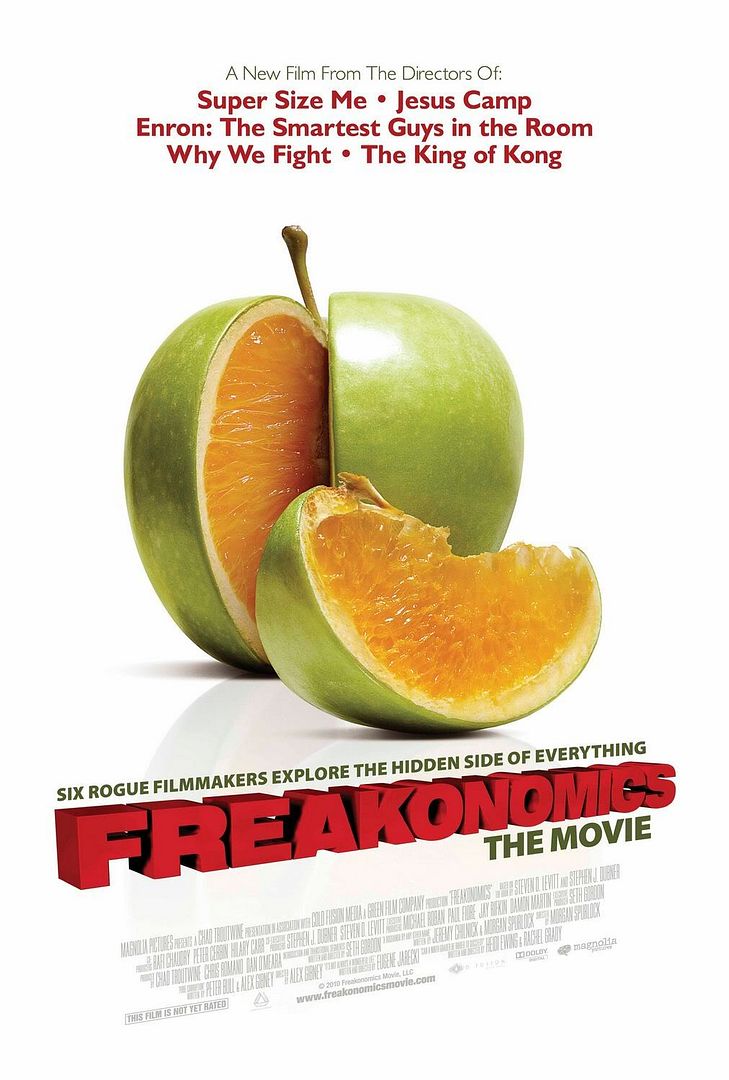Country:
USA
Recognizable Faces:
Steven Levitt
Stephen Dubner
Akebono
Directed By:
Heidi Ewing
Alex Gibney
Seth Gordon
Rachel Grady
Eugene Jarecki
Morgan Spurlock
*spoilers, I suppose*
USA
Recognizable Faces:
Steven Levitt
Stephen Dubner
Akebono
Directed By:
Heidi Ewing
Alex Gibney
Seth Gordon
Rachel Grady
Eugene Jarecki
Morgan Spurlock
*spoilers, I suppose*
I've taken interest in the Freakonomics phenomenon for a while now, but never took the time to sit down and read/view the damn thing. For those who don't know what I'm talking about, FREAKONOMICS was a book that came out in 2005, from University of Chicago economist Steven Levitt and New York Times journalist Stephen Dubner. Their point? Show a practical side of economics, reintroduce it as a tool that doesn't answer just the boring questions. FREAKONOMICS, the movie was indeed a very entertaining little piece of documentary, but made many questionable choices in its presentation, which dragged the movie version down considerably. I loved the concept, the boldness of Levitt and Dubner who never hesitate to provoke the well-thinking, but whoever came out with the idea of having six directors and whoever chose the chapters to introduce into the movie was terribly wrong. Turned what could've been a great documentary into something that didn't do justice to Levitt and Dubner.
There are six chapters to the book and four distinguishable segments to the movie. Some were downright fascinating. The socioeconomic pattern of naming children for example. Levitt and Dubner start from the idea that a parent will name his child something unique or classy or fierce, so he can have a fighting chance in life. That's a myth, because it's your environment that will ultimately determine what you name will be. It will give your parents variables to chose from. They give in example the African-American names before and after the civil rights movement, the Black Panthers ans the sixties. Black kids were named John, Michael, Greg, Jane or Rose back then, but it's the sixties that brought names like DeShawn, Shaniqua, Tyrone, Shaquille, etc.That's when the African-American identity took a life of its own. As a counter-example FREAKONOMICS relate the fascinating story of Robert Lane, who named his two youngest sons Winner and Loser. Crazy, isn't it? Well, believe it or not (I checked it up afterwards), Winner became a criminal and Loser became a cop and goes by Lou, now.
A more controversial argument was Levitt and Dubner's take on the radical crime drop in the 1990s. Many opportunistic politicians attributed this spectacular drop to their courageous struggle, but Levitt and Dubner went and dug deeper. They attributed half of the crime drop to legalization of abortion in 1973. Bold, indeed but their data is rather freaky. Their point is that by the time unwanted babies reached their prime age for crime, they just weren't there and according to their study, in states where abortion was easy of access and not just "legal" , crime dropped 30% lower. It's kind of a stretch to say abortion fights crime, but such a spectacular drop cannot be attributed only to fighting measures. It shows something on the structural level of society had changed. Does abortion fights crime? No. Did it had a role to play in the crime drop of the nineties? Probably.
The biggest issue I had with FREAKONOMICS is the last segment, which is by far the bulkiest. It's directed by Rachel Grady (of the JESUS CAMP legacy) and follows a high school's experiment to bribe a kid into success. My problem is...IT DOESN'T WORK. Their results are unconvincing at best and the segment is stretched out really thin in attempt to make sense of it. Five directors spend about fifty minutes trying to build a strong argument for the Freakonomics approach and it just goes down the drain in the last stretch. The books offered other material to chose from, so why pick this? Why not chose the book's chapter about the Ku Klux Klan and real estate agents? That looked pretty darn cool. The six superstar director approach was meant to make the movie dynamic and fast paced, but it ends up feeling chaotic and disjointed.
In the long run, I can only get behind that sort of thinking. I'm just disappointed it was poorly presented in a movie. Documentaries have been trending over the last decade and have become a powerful tool of communication, so it's a missed opportunity. Especially with such an all-star cast of directors. I can only command Steven Levitt and Stephen Dubner for thinking outside the box and trying to use their knowledge to produce entertained, reachable data for the everyman. Fans of Chuck Klosterman like me shouldn't be in uncharted territory here. Levitt and Dubner treat of more serious subjects, but the approach in rather similar. I'd say read the book. The documentary is decent, but ultimately disappointing for all it promised.
SCORE: 72%

